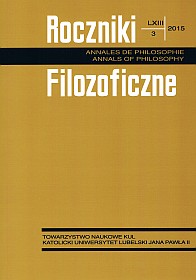Pruss on the Requirement of Universal Love
Abstract
Throughout his excellent book One Body, Alex Pruss relies upon the view that there is a requirement of universal love: each and every one of us is required to love each and every one of us. Although he often appeals to revealed truth in making arguments for his various theses, he supports the requirement of universal love primarily through a philosophical argument, an argument that I call the “argument from responsiveness to value.” The idea is that all persons bear a sort of nonrelational value, and because this value gives every agent reasons to respond to it positively, each and every person is bound to love each and every person. The aim of this paper is to criticize this argument. Pruss’s argument has two important gaps, one concerning the sort of reasons that the value of persons gives and one concerning whether the required response is the response of love.
References
Aquinas, St. Thomas. 1981. Summa Theologiae, trans. Fathers of the English Dominican Province. Christian Classics.
Davison, Scott A. 2012. On the Intrinsic Value of Everything. New York: Continuum.
Gert, Joshua. 2004. Brute Rationality: Normativity and Human Action. Cambridge University Press.
Murphy, Mark C. 2014. “Toward God’s Own Ethics.” In Challenges to Religious and Moral Belief, edited by Michael Bergmann and Patrick Kain. Oxford: Oxford University Press.
Murphy, Mark C. 2002. An Essay on Divine Authority. Ithaca: Cornell University Press.
Nagel, Thomas. 1970. The Possibility of Altruism. Princeton: Princeton University Press.
Pruss, Alexander. 2013. One Body: An Essay in Christian Sexual Ethics. Notre Dame: University of Notre Dame Press.
Schroeder, Mark. 2007. “Reasons and Agent-Neutrality.” Philosophical Studies 135:279–306.
Swinburne, Richard. 1994. The Christian God. Oxford: Clarendon Press.
Copyright (c) 2015 Roczniki Filozoficzne

This work is licensed under a Creative Commons Attribution-NonCommercial-NoDerivatives 4.0 International License.





